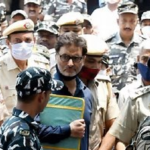
In a significant development for the Karnataka government, Chief Minister Siddaramaiah is set to induct 24 new ministers into his cabinet on Saturday. The final list of names was reportedly approved during a meeting between Siddaramaiah, his deputy DK Shivakumar, and central leaders of the Congress party in Delhi. Prior to the swearing-in ceremony, the Chief Minister is scheduled to meet with Rahul Gandhi, the party’s leader, for a final endorsement on Friday.
The cabinet expansion comes just a week after Siddaramaiah and DK Shivakumar were sworn in as Chief Minister and Deputy Chief Minister, respectively. On that occasion, eight MLAs, including Priyank Kharge, the son of Congress chief Mallikarjun Kharge, also took oath for ministerial positions. However, portfolio allocations have not yet been announced, which has drawn criticism from the opposition Bharatiya Janata Party (BJP). The Congress party has responded by referencing the time when former Chief Minister BS Yediyurappa ran a one-man cabinet during the pandemic.
The task of formulating the ministerial list and allocating portfolios poses a challenge for the Congress party as it strives to strike a balance and represent diverse communities within the state. The Lingayat community, a politically crucial group in Karnataka, had claimed the Chief Minister’s position, citing their significant contribution to the Congress party’s victory. With a Lingayat Chief Minister absent, speculations arise that a significant number of ministerial berths may be allotted to MLAs from the community.
Additionally, with general elections scheduled for next year, the Congress party is under pressure to demonstrate quick results and fulfill the promises made before the elections. Karnataka’s 28 Lok Sabha seats make it a major battleground state. The new Congress government, represented by newly appointed minister Priyank Kharge, has already expressed intentions to review and rectify policies implemented by the previous BJP government. This has fueled speculation of potential rollbacks in decisions related to the Muslim quota, hijab ban, and the anti-conversion law.
Speaking exclusively to NDTV, Priyank Kharge stated, “Any bill, executive order, or government order that is regressive to the economic policies of Karnataka, that does not create employment, or that creates disharmony in the state will be reviewed or rejected if necessary.”
The recent state elections in Karnataka witnessed a resounding victory for the Congress party, securing 135 out of the 224 seats. The BJP, the incumbent party, managed to win 66 seats, while HD Kumaraswamy’s Janata Dal Secular secured 19 seats. Moreover, the Congress party increased its vote share from 38.1% in 2018 to 42.9%, with a significant portion coming from a decline in JD(S) votes.
As Karnataka gears up for a new cabinet and policy changes, all eyes will be on the government to see how it navigates the challenges of governance, community representation, and meeting the expectations of its constituents ahead of the upcoming general elections.





